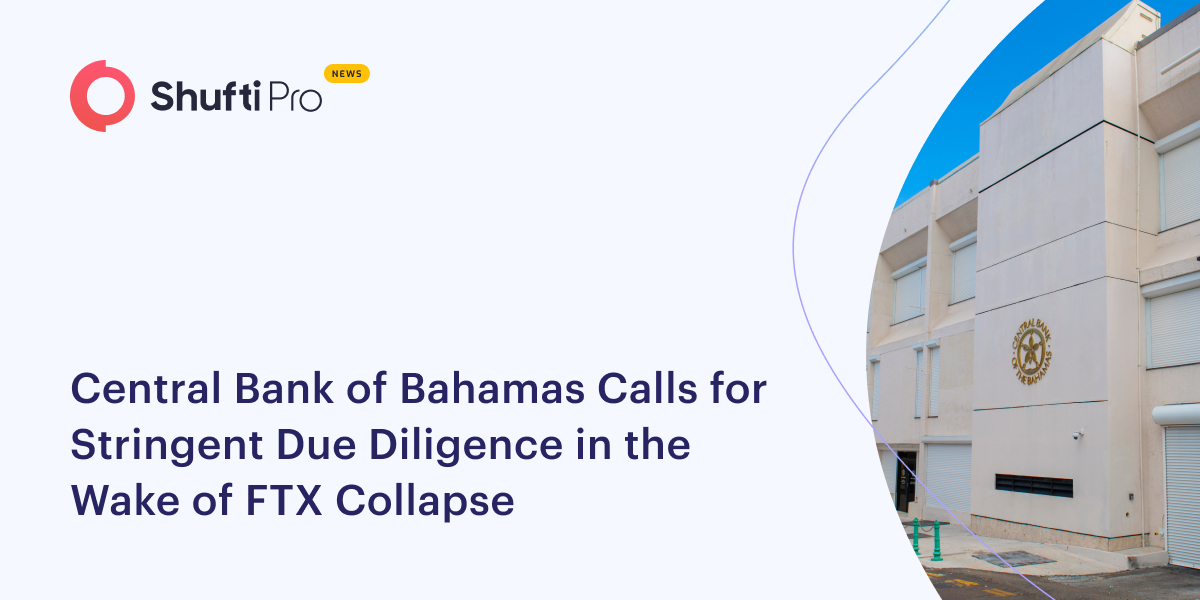Central Bank of Bahamas Calls for Stringent Due Diligence in the Wake of FTX Collapse

The Bahamas’ Central Bank has called for stricter due diligence while moving funds in the wake of the FTX collapse.
The Central Bank requests that the entire risk management procedures of the Supervised Financial Institution (SFI) completely incorporate the risk management framework controlling digital asset activity.
It said: “Any increase in risks posed by digital assets exposure should be captured and effectively incorporated into SFIs’ Internal Capital Adequacy Assessment Process (ICAAP). In carrying out digital asset activities, SFIs must comply with the obligations imposed by the AML/CFT laws of The Bahamas as well as the Central Bank’s revised Guidelines on the Prevention of Money Laundering & Countering the Financing of Terrorism.”
The guidelines also urge SFIs to make sure their clients are “adequately informed of the fundamental benefits, risks, and terms of the products” they are purchasing. The cryptocurrency that FTX was permitting investors to buy was linked to other speculative investments as FTX just issued new coins as they were needed with nothing to support their value.
Despite the new regulations, SFIs are not allowed to provide conventional payment services to companies that deal in digital assets. But, the Central Bank has the power to place additional requirements on SFIs to provide such services, including the issuance of digital tokens and conducting business on behalf of customers who trade in digital assets. Additionally, SFIs are mandated to notify the Central Bank before dealing with Initial Token Offering (ITO).
The draft guidelines also state: “FIs are also required to notify the Central Bank prior to onboarding relationships with Digital Assets Service Providers. SFIs should communicate the details of the relationship and ensure that the entity has the proper risk management framework to mitigate any risks that could materialise from the third-party or outsourcing arrangements. Any additional requirements would depend on the SFI’s existing reporting requirements, profitability, and capital adequacy. Further, it is the duty of the SFI to inform the Central Bank of any third party service provider arrangements in which the licensee may be involved.”
SFIs should carry out Enhanced Due Diligence (EDD) before enrolling new customers for digital asset custodial services in order to identify the origins of the assets as well as the source of funds used to buy them. SFIs should also get a list of the account’s signatories and beneficiaries. The customer should be required to supply combinations of their public, private key, or wallet address, as required, to verify the beneficial owner of the digital wallet.
It added: “SFIs must maintain adequate accounting and other relevant records, adequate systems; and controls to accurately track ownership and quantity of digital client assets; and maintain appropriate business continuity processes, procedures, and controls.” More importantly, “SFIs must not accept virtual currency tokens or other digital assets as deposit liabilities on their balance sheets.”
The Central Bank would only permit SFIs to issue digital wallet that is linked to money kept on the SFI’s accounting records as fiat deposit liabilities or fiat funds that have been placed in the custody of SFIs for electronic money transactions”, and these finances will also be supported by central bank fiat currency. This places the central bank at the core of the risk of guaranteeing that all digital wallets are supported by it as it assumes total accountability for the risk in the digital assets and Registered Exchanges (DARE) Act.
Suggested Reads:
FCA Says Bankman-Fried FTX Cryptocurrency Exchange Not Regulated in the UK
FTX Customers File Class Action Against Bankrupt Crypto Exchange
The Bahamas to Launch a Payment Card for Central Bank Digital Currency

 Explore Now
Explore Now













